|
Here are all the paintings of STRIGEL, Bernhard 01
| ID |
Painting |
Oil Pantings, Sorted from A to Z |
Painting Description |
| 39729 |
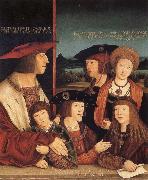 |
Emperor Maximilian I and his family |
mk150
1516
72.8x60.4cm
|
| 40312 |
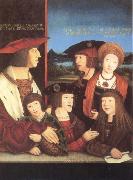 |
Emperor Maximilian i with his family |
mk156
1516
Oil on panel
72.8x60.4cm
|
| 45257 |
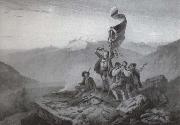 |
Gedenkblatt auf das Jahr |
mk181
1848
Munchen Stadtmuseum
|
| 63694 |
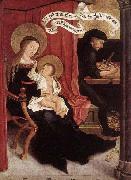 |
Holy Family |
1505 Panel Germanisches Nationalmuseum, Nuremberg The picture shows a panel of the Mindenheimer Altarpiece.Artist:STRIGEL, Bernhard Title: Holy Family Painted in 1501-1550 , German - - painting : religious |
| 9159 |
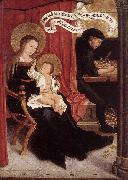 |
Holy Family et |
c. 1505
Panel
Germanisches Nationalmuseum, Nuremberg |
| 9160 |
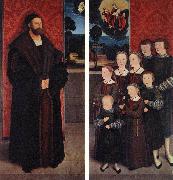 |
Portrait of Conrad Rehlinger and his Children ar |
1517
Wood, 209 x 101 cm and 209 x 98 cm
Alte Pinakothek, Munich |
| 9158 |
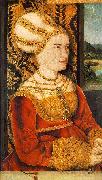 |
Portrait of Sybilla von Freyberg (born Gossenbrot) er |
Wood, 61 x 35,8 cm
Alte Pinakothek, Munich |
| 9162 |
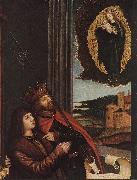 |
St Ladislas Presents Wladislav II and his Sons to the Virgin (detail) wr |
1511-12
Wood, 43 x 30,8 cm (full panel)
Museum of Fine Arts, Budapest |
| 9161 |
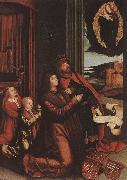 |
St Ladislas Presents Wladislav II and his Sons to the Virgin r |
1511-12
Wood, 43 x 30,8 cm
Museum of Fine Arts, Budapest |
|
|
| STRIGEL, Bernhard
|
| German Northern Renaissance Painter, ca.1460-1528..Painter, son or nephew of Hans Strigel II. His training with Hans Striegel II shows stylistically in his early works in the Grisons, e.g. the Last Judgement (1486; Brigels, pilgrimage chapel of St Eusebius) and an altarpiece at Disentis (1489; St Johann Baptist). In the 1480s and 1490s he also worked in the studio of Ivo Strigel. Motifs in his pictures stem from engravings by Martin Schongauer and from Ulm book woodcuts. He met Bartholomus Zeitblom as a fellow worker on the high altar (1493-4) of Blaubeuren Abbey, both being influenced by Netherlandish art: Zeitblom by Rogier van der Weyden but Strigel primarily by Dieric Bouts. This influence is also seen in his Adoration of the Magi altarpiece (c. 1500; Memmingen, Stedtmus.). The altar of the Virgin for the monastery at Salem (1507-8; Salem, Schloss) has links with D?rer's graphic work: an increasing three-dimensionality and monumentalization of the objects and figures, and their disposition in space.
|
|


